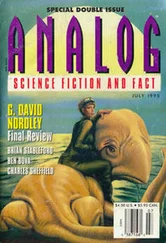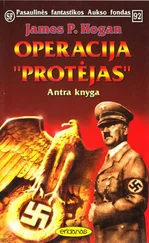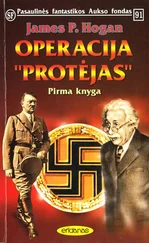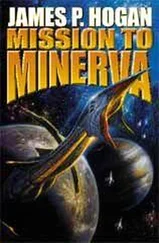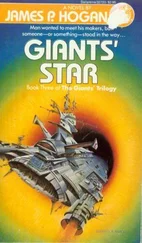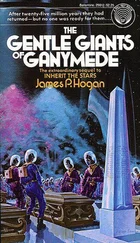James Hogan - Inherit the Stars
Здесь есть возможность читать онлайн «James Hogan - Inherit the Stars» весь текст электронной книги совершенно бесплатно (целиком полную версию без сокращений). В некоторых случаях можно слушать аудио, скачать через торрент в формате fb2 и присутствует краткое содержание. Жанр: Фантастика и фэнтези, на английском языке. Описание произведения, (предисловие) а так же отзывы посетителей доступны на портале библиотеки ЛибКат.
- Название:Inherit the Stars
- Автор:
- Жанр:
- Год:неизвестен
- ISBN:нет данных
- Рейтинг книги:3 / 5. Голосов: 1
-
Избранное:Добавить в избранное
- Отзывы:
-
Ваша оценка:
- 60
- 1
- 2
- 3
- 4
- 5
Inherit the Stars: краткое содержание, описание и аннотация
Предлагаем к чтению аннотацию, описание, краткое содержание или предисловие (зависит от того, что написал сам автор книги «Inherit the Stars»). Если вы не нашли необходимую информацию о книге — напишите в комментариях, мы постараемся отыскать её.
Inherit the Stars — читать онлайн бесплатно полную книгу (весь текст) целиком
Ниже представлен текст книги, разбитый по страницам. Система сохранения места последней прочитанной страницы, позволяет с удобством читать онлайн бесплатно книгу «Inherit the Stars», без необходимости каждый раз заново искать на чём Вы остановились. Поставьте закладку, и сможете в любой момент перейти на страницу, на которой закончили чтение.
Интервал:
Закладка:
Eventually Hunt said: "To think-a generation ago, all this was just desert." It was more a thought voiced than a statement.
Danchekker did not answer for a long time. When he did, he kept his eyes fixed outside.
"But man dared to dream…" he murmured slowly. After a pause he added, "And what man dares to dream today, tomorrow he makes come true."
Another long silence followed. Hunt took a cigarette from his case and lit it. "You know," he said at last, blowing a stream of smoke slowly toward the glass wall of the dome, "it’s going to be a long voyage to Jupiter. We could get a drink down below-one for the road, as it were."
Danchekker seemed to turn the suggestion over in his mind for a while. At length he shifted his gaze back within the confines of the dome and turned to face Hunt directly.
"I think not, Dr. Hunt," he said quietly.
Hunt sighed and made as if to turn.
"However,…" The tone of Danchekker’s voice checked him before he moved. He looked up. "If your metabolism is capable of withstanding the unaccustomed shock of nonalcoholic beverages, a strong coffee might, ah, perhaps be extremely welcome."
It was a joke. Danchekker had actually cracked a joke!
"I’ll try anything once," Hunt said as they began walking toward the door of the elevator.
Chapter Nineteen
Embarkation on the orbiting Jupiter Five command ship was not scheduled to take place until a few days later. Danchekker would be busy making final arrangements for his team and their equipment to be ferried up from the Lunar surface. Hunt, not being involved in these undertakings, prepared an itinerary of places to visit during the free time he had available.
The first thing he did was fly to Tycho by surface transporter to observe the excavations still going on around the areas of some of the Lunarian finds, and to meet at last many of the people who up until then had existed only as faces on display screens. He also went to see the deep mining and boring operations in progress not far from Tycho, where engineers were attempting to penetrate to the core regions of the Moon. They believed that concentrations of rich metal-bearing ores might be found there. If this turned out to be so, within decades the Moon could become an enormous spaceship factory, where parts prefabricated in processing and forming plants on the surface would be ferried up for final assembly in Lunar orbit. The economic advantages of constructing deep-space craft here and from Lunar materials, without having to lift everything up out of Earth’s gravity pit to start with, promised to be enormous.
Next, Hunt visited the huge radio and optical observatories of Giordano Bruno on Farside. Here, sensitive receivers, operating fully shielded from the perpetual interference from Earth, and gigantic telescopes, freed from any atmosphere and not having to contend with distortions induced by their own weights, were pushing the frontiers of the known Universe way out beyond the limits of their Earth-bound predecessors. Hunt sat fascinated in front of the monitor screens and resolved planets of some of the nearer stars; he was shown one nine times the size of Jupiter, and another that described a crazy figure-eight orbit about a double star. He gazed deep into the heart of the Andromeda Galaxy, and out at distant specks on the very threshold of detection. Scientists and physicists described the strange new picture of the Cosmos that was beginning to emerge from their work here and explained some of the exciting advances in concepts of space-time mechanics, which indicated that feasible methods could be devised for deforming astronomic geodesics in such a way that the limitations once thought to apply to extreme effective velocities could be avoided. If so, interstellar travel would become a practical proposition; one of the scientists confidently predicted that man would cross the Galaxy within fifty years.
Hunt’s final stop brought him back to Nearside-to the base at Copernicus near which Charlie had been found. Scientists at Copernicus had been studying descriptions of the terrain over which Charlie had traveled and the accompanying sketched maps; the information contained in the notebook had been transmitted up from Houston. From the traveling times, distances, and estimates of speed quoted, they suspected that Charlie’s journey had begun somewhere on Farside and had brought him, by way of the Jura Mountains, Sinus Iridum, and Mare Imbrium, to Copernicus. Not everybody subscribed to this opinion, however; there was a problem. For some unaccountable reason, the directions and compass points mentioned in Charlie’s notes bore no relationship to the conventional lunar north-south that derived from its axis of rotation. The only route for Charlie’s journey that could be interpreted to make any sense at all was the one from Farside across Mare Imbrium, but even that only made sense if a completely new direction was assumed for the north-south axis.
Attempts to locate Gorda had so far met with no positive success. From the tone of the final entries in the diary, it could not have been very far from the spot where Charlie was found. About fifteen miles south of this point was an area covered by numerous overlapping craters, all confirmed as being meteoritic and of recent origin. Most researchers concluded that this must have been the site of Gorda, totally obliterated by a freak concentration of meteorites in the as yet unexplained storm.
Before leaving Copernicus, Hunt accepted an invitation to drive out overland and visit the place of Charlie’s discovery. He was accompanied by a Professor Alberts from the base and the crew of the UNSA survey vehicle.
The survey vehicle lumbered to a halt in a wide gorge, between broken walls of slate-gray rock. All around it, the dust had been churned into a bewildering pattern of grooves and ridges by Caterpillar tracks, wheels, landing gear, and human feet-evidence of the intense activity that had occurred there over the last eighteen months. From the observation dome of the upper cabin, Hunt recognized the scene immediately; he had first seen it in Caldwell’s office. He identified the large mound of rubble against the near wall of the gorge, and above it the notch leading into the cleft.
A voice called from below. Hunt rose to his feet, his movements slow and clumsy in his encumbering spacesuit, and clambered through the floor hatch and down a short ladder to the control cabin. The driver was stretching back in his seat, taking a long drink from a flask of hot coffee. Behind him, the sergeant in command of the vehicle was at a videoscreen, reporting back to base via comsat that they had reached their destination without mishap. The third crew member, a corporal who was to accompany Hunt and Alberts outside and who was already fitted out, was helping the professor secure his helmet. Hunt took his own helmet from the storage rack by the door and fixed it in place. When the three were ready, the sergeant supervised the final checkout of life-support and communications systems and cleared them to pass, one by one, through the airlock to the outside.
"Well, there you are, Vic. Really on the Moon now." Alberts’s voice came through the speaker inside Hunt’s helmet. Hunt felt the spongy dust yield beneath his boots and tried a few experimental steps up and down.
"It’s like Brighton Beach," he said.
"Okay, you guys?" asked the voice of the UNSA corporal.
"Okay."
"Sure."
"Let’s go, then."
The three brightly colored figures-one orange, one red, and one green-began moving slowly along the well-worn groove that ran up the center of the mound of rubble. At the top they stopped to gaze down at the survey vehicle, already looking toylike in the gorge below.
They moved into the cleft, climbing between vertical walls of rocks that closed in on both sides as they approached the bend. Above the bend the cleft straightened, and in the distance Hunt could see a huge wall of jagged buttresses towering over the foothills above them-evidently the ridge described in Charlie’s note. He could picture vividly the scene in this very place so long ago, when two other figures in spacesuits had toiled onward and upward, their eyes fixed on that same feature. Above it, the red and black portent of a tormented planet had glowered down on their final agony like…
Читать дальшеИнтервал:
Закладка:
Похожие книги на «Inherit the Stars»
Представляем Вашему вниманию похожие книги на «Inherit the Stars» списком для выбора. Мы отобрали схожую по названию и смыслу литературу в надежде предоставить читателям больше вариантов отыскать новые, интересные, ещё непрочитанные произведения.
Обсуждение, отзывы о книге «Inherit the Stars» и просто собственные мнения читателей. Оставьте ваши комментарии, напишите, что Вы думаете о произведении, его смысле или главных героях. Укажите что конкретно понравилось, а что нет, и почему Вы так считаете.


![Лаура Бренз - Потомственная ведьма[Inherit the Witch]](/books/79609/laura-brenz-potomstvennaya-vedma-inherit-the-witch-thumb.webp)
